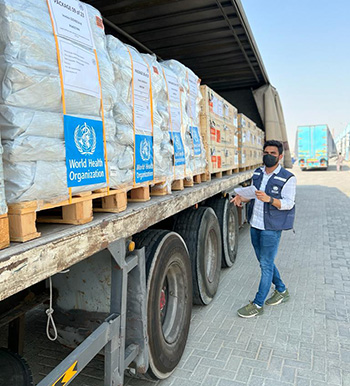 09 September 2022, Islamabad, Pakistan – Two shipments carrying much needed emergency medical supplies and equipment arrived in Karachi, Pakistan, today in response to critical shortages in the country, ravaged by the most extensive floods in recent history. The shipments contain 15.6 metric tons of cholera kits, water and multipurpose tents that can be used as medical tents.
09 September 2022, Islamabad, Pakistan – Two shipments carrying much needed emergency medical supplies and equipment arrived in Karachi, Pakistan, today in response to critical shortages in the country, ravaged by the most extensive floods in recent history. The shipments contain 15.6 metric tons of cholera kits, water and multipurpose tents that can be used as medical tents.
The supplies, estimated at a total value of US$ 174,816, were delivered to Pakistan with the support of the Government of Dubai and the International Humanitarian City.
The Government of Dubai and the International Humanitarian City have established an air-bridge linking the United Arab Emirates and Pakistan, which is now fully operational with several rotations having already arrived in Pakistan to deliver critical humanitarian supplies in response to the recent flooding.
“The floods have severely impacted the lives of millions in Pakistan. We are currently working with the national authorities to ensure access to health care and medical supplies, mitigate the risk of disease outbreak, coordinate the response to ensure critical gaps are met, and prepare for any worsening of the situation over the coming weeks,” said Dr Palitha Mahipala, WHO Representative in Pakistan.
“Thanks to the Government of Dubai, the International Humanitarian City and WHO’s logistic hub in Dubai, this critical shipment is arriving at an opportune time and will be immensely useful in helping to strengthen essential health services and control the spread of disease, especially in displaced persons camps lacking safe water and sanitary conditions.”
The scale of the humanitarian crisis in the flood-hit areas of Pakistan is unprecedented, with more than 33 million people affected, over 1 million houses damaged or destroyed, over 600,000 persons internally displaced in camps and over 1460 health facilities damaged.
The health threats are enormous, leaving the most vulnerable, including women and children, at increased risk of diseases such as diarrhoea, cholera, malaria, dengue fever, acute respiratory infections and typhoid—already reported in flood-affected areas.
In close coordination with the Ministry of National Health Services Regulations and Coordination, National Institute of Health and partners, WHO is playing a leading role in the health response, providing guidance and health interventions on all fronts, focusing on the current health impact of the floods, while scaling up preparedness for the additional health risks expected to emerge.


